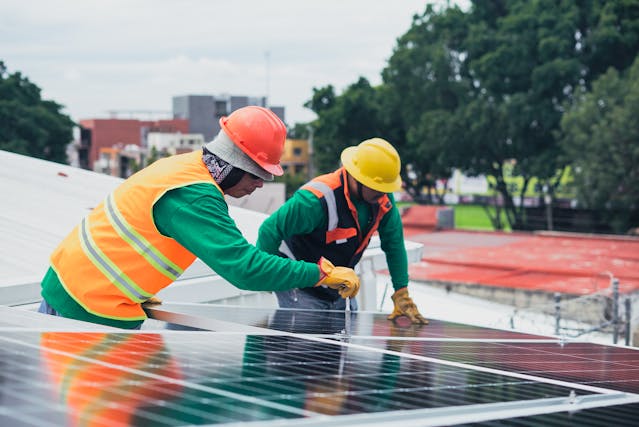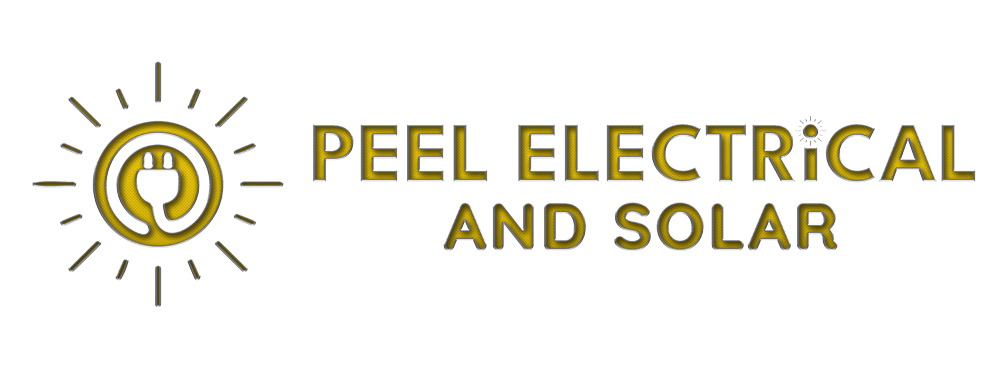
Solar panel cleaning is an essential part of maintaining the efficiency and longevity of your solar power system. Over time, dust, dirt, bird droppings, and other debris accumulate on the surface of solar panels, blocking sunlight and reducing their energy output. While rain can wash away some of the dirt, it’s often not enough to clear stubborn grime or deposits, especially in areas prone to pollution or dry, dusty conditions. Whether you’re cleaning solar panels on your roof, maintaining portable panels, or looking into automated cleaning systems for larger installations, regular solar panel cleaning is necessary to keep your solar panels operating at peak efficiency.
How to Clean Solar Panels on Roofs?
Cleaning solar panels on the roof can be a bit tricky and requires safety precautions. First, ensure the solar panels are switched off. If possible, use a ladder to reach the panels without walking directly on the roof. Use a hose with distilled water to rinse off dust and dirt. If there’s stubborn grime, you can use a soft brush or sponge with mild soapy water. Avoid harsh chemicals and high-pressure washers, as they can damage the panels. If you’re uncomfortable with heights or the roof is difficult to access, hiring a professional solar cleaning service is the best option.
How to Clean Solar Panels at Home?
Cleaning solar panels at home can be a DIY task if you have the right tools. Start by turning off the panels, then use a hose to rinse them down. A soft cloth or sponge, along with a bucket of soapy water, is usually sufficient for cleaning off dirt and bird droppings. Avoid using harsh chemicals, which can damage the protective coating of the panels. If you notice stubborn stains, gently scrub them with a non-abrasive brush. It’s also important to clean the panels in the early morning or evening to avoid thermal shock.
How to Clean Solar Panels on Roof Automatically?
For larger installations or hard-to-reach areas, automatic solar panel cleaning systems are available. These systems often use robotic cleaners programmed to clean the panels at regular intervals. Some setups have built-in water sprinklers or self-cleaning coatings that minimize the need for manual intervention. Automated cleaning is highly efficient and ensures that solar panels are cleaned without any physical labor, making it ideal for large commercial installations.
What Do You Use to Clean Solar Panels?
To clean solar panels, it’s best to use gentle materials to avoid scratching the surface. A soft sponge or microfiber cloth is ideal for wiping down the panels. Use distilled water, but avoid hard water that can leave mineral deposits. Mild, soapy water is effective for removing dirt and grime. You can also use a soft brush for scrubbing tougher spots. High-pressure washers and harsh chemicals should be avoided as they can damage the solar cells.
What is the Best Way to Clean Solar Panels?
The best way to clean solar panels is to rinse them with distilled water and gently wipe away debris with a soft cloth or sponge. Always clean the panels when they are cool to prevent water from evaporating too quickly and leaving streaks. Using mild soap can help loosen tough dirt, but avoid using harsh chemicals. If your panels are difficult to reach or if you have a large system, hiring a professional service is the safest and most effective option.
Can I Clean Solar Panels with a Pressure Washer?
Using a pressure washer to clean solar panels is not recommended. The high-pressure stream of water can damage the delicate glass surface and the electrical components within the panels. Instead, use a hose with a gentle stream of water to rinse the panels and remove loose dirt. For more stubborn stains, a soft sponge or brush can be used with soapy water.
Can I Clean Solar Panels with Windex?
Windex or similar glass-cleaning products are not recommended for solar panels. These chemicals can leave residues that reduce the efficiency of the panels. Instead, use mild soap and water to clean the panels. Harsh chemicals in products like Windex will also damage the protective coatings on the panels, reducing their lifespan.
Can You Clean Solar Panels with Tap Water?
Tap water can be used to clean solar panels, but it’s best to use distilled water if possible. This is because tap water often contains minerals that can leave deposits or streaks on the panels after it dries. If tap water is your only option, make sure to thoroughly dry the panels or rinse them with distilled water afterward to avoid any buildup.
Can You Use Vinegar to Clean Solar Panels?
Vinegar is a natural cleaner, but it’s not the best choice for cleaning solar panels. While it is effective for removing hard water stains on windows, it may not be as gentle on solar panel coatings. Instead, it’s better to stick to mild soapy water and a soft cloth to clean the panels.
Do Solar Hot Water Panels Need Cleaning?
Yes, solar hot water panels also need regular cleaning to maintain their efficiency. Dirt, debris, and bird droppings can accumulate on the surface, blocking sunlight and reducing the panels’ ability to heat water. Clean them in a similar way to photovoltaic panels, using mild soap, water, and a soft cloth to remove any buildup.
Do You Need a License to Clean Solar Panels?
Generally, you don’t need a specific license to clean solar panels, but professional cleaners may require relevant certifications or training for working at heights and handling electrical systems. It’s essential to follow safety protocols, especially when cleaning rooftop panels. If you’re cleaning panels on a commercial scale or offering it as a professional service, insurance and training are recommended.
Does Cleaning Solar Panels Improve Performance?
Yes, cleaning solar panels significantly improves their performance. Dust, dirt, and other debris block sunlight, reducing the amount of energy the panels can generate. Studies have shown that cleaning can increase solar panel efficiency by 15-20%, depending on the amount of buildup. Regular cleaning helps ensure that the panels are operating at optimal capacity.
Does Rain Clean Solar Panels?
While rain can wash away some dust and light dirt from solar panels, it’s usually not enough to remove stubborn grime or bird droppings. In fact, rainwater can leave mineral deposits that create streaks or a film over time. Therefore, while rain can help, it’s still important to manually clean the panels periodically to maintain maximum efficiency.
How to Clean Portable Solar Panels?
Portable solar panels can be cleaned in the same way as fixed ones. Use a soft brush or cloth and mild soapy water to clean off any dirt or debris. Since these panels are often more exposed to dust and grime due to their portability, regular cleaning is essential. Make sure they are cool before cleaning and avoid using harsh chemicals or abrasive materials.
How to Clean Under Solar Panels?
Cleaning under solar panels is necessary to remove debris like leaves or dirt that can accumulate and block airflow, which could affect their cooling and efficiency. Use a soft brush or blower to remove any debris from under the panels. For roof-mounted systems, ensure you take safety precautions, as this might involve accessing tight or elevated areas.
How to Professionally Clean Solar Panels?
Professional solar panel cleaning typically involves using specialized equipment such as long-handled brushes, water-fed poles, and purified water systems to ensure no residues or streaks are left behind. Professionals are trained to clean the panels efficiently and safely, especially in difficult-to-reach areas. They may also inspect the panels for any damage or wear during the cleaning process.
Is It Safe to Clean Solar Panels?
Yes, it’s safe to clean solar panels as long as you follow proper safety measures. Turn off the system before cleaning, use soft cleaning materials, and avoid walking on the panels. For roof-mounted panels, use appropriate ladders and safety gear to prevent accidents. If you’re unsure, hiring a professional service ensures safe and effective cleaning.
What Is the Best Time to Clean Solar Panels?
The best time to clean solar panels is in the early morning or late evening when the panels are cool. Cleaning panels during the heat of the day can cause the water to evaporate too quickly, leaving streaks. Cool panels are also safer to handle and less likely to experience thermal shock.
What is the Proper Way to Clean Solar Panels?
The proper way to clean solar panels involves first rinsing them with distilled water to remove loose dirt. Use a soft sponge or brush and mild soapy water to clean any stubborn spots. Avoid using high-pressure washers or harsh chemicals, as these can damage the panels. Rinse thoroughly and ensure no soap residue is left behind.
How to Clean Residential Solar Panels?
To clean residential solar panels, start by turning off the system. Use a hose to rinse off dust and debris, then gently scrub with a soft brush and mild soap if needed. Make sure the panels are cool to the touch to avoid any heat-related issues. Depending on your home’s location and environmental conditions, residential solar panels may need to be cleaned two to four times a year.
Local Area We Served
We proudly offer professional solar panel cleaning services across various locations in New South Wales, ensuring that your solar system operates at maximum efficiency. If you need expert cleaning for your solar panels, don’t hesitate to contact us for a thorough and reliable service. We serve the following areas:
Nowra, New South Wales
South Nowra, New South Wales
City of Shoalhaven, New South Wales
Jervis Bay, New South Wales
Ulladulla, New South Wales
Batemans Bay, New South Wales
South Coast, New South Wales
Reach out to us today to schedule your solar panel cleaning!
